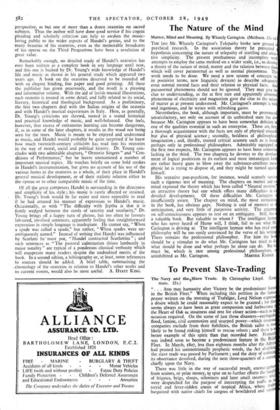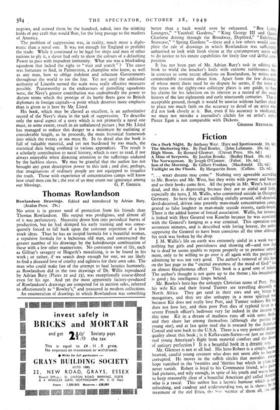To Prevent Slave-Trading
The Navy and the‘Slave Trade. By Christopher Lloyd. mans. 21s.) " . . AND may humanity after Victory be the predominant feat in the British Fleet." When including this petition in the fans prayer written on the morning of Trafalgar, Lord Nelson expres a desire which he could reasonably expect to be granted • for seems always to have been as great compassion and forbearance the Heart of Oak as stoutness and zest for closer action—each as occasion required. On the scene of just those disasters—carthquA flood, famine, civil commotion and usurped power—which insura companies exclude from their liabilities, the British sailor is M likely to be found risking himself to rescue others • and there is better example of this spirit than that recorded ben. Hurnaa was indeed soon to become a predominant feature in the Br Fleet. In March, 18o7, less than eighteen months after the AcInili had penned his unintentionally prophetic words, the Act aboli the slave trade was passed by Parliament ; and the duty of cnfo its observance devolved, during the next three-quarters of a cent chiefly upon the Navy. There was little in the way of successful result, encoura from seniors, or prize money, tv spur on to further efforts the handf of frigates, brigs, sloops, schooners and later small steamers v.'h were despatched for the purpose of intercepting the traffic 10 torrid and fever-ridden coasts of tropical Africa, where ul bargained with native chiefs for cargoes of bewildered and :err
negroes, and stowed them by the hundred, naked, into the stinking holds of any craft that would float, for the long passage to the markets of America.
The problem of suppression was, in reality, much more a diplo- matic than a naval one. It was not enough for England to prohibit the trade. While it continued to be legal for ships and men of other nations to ply it, a slaver had only to show the colours of a defaulting Power to pass with impudent immunity. What use was a blockading squadron that lacked the right to " visit and search " ? The cause was fortunate to find, in Palmerston, a champion who knew, as well as any man, how to oblige indolent and reluctant Governments throughout the world to toe the line. Yet not until the additional authority of Lincoln turned the scale were really effective measures possible. Praiseworthy as the endeavours of patrolling squadrons were, the Navy's greater contribution was undoubtedly the power to dictate terms which the prestige of its battle fleets gave to British diplomats in foreign capitals—a point which deserves more emphasis than is given to it here by Mr. Lloyd.
His book, which may be classed as excellent, is an authoritative record of the Navy's share in the task of suppression. To describe only the naval aspect of a story which is not primarily a naval one must, to some extent, result in an unbalanced picture ; but Mr. Lloyd has managed to reduce this danger to a minimum by outlining at considerable length, as he proceeds, the main historical framework into which the events at sea must fit. In its detail also the book is full of valuable material, and yet not burdened by too much, the statistical data being confined to various appendices. The result is a scholarly contribution to naval history, which is easy to read, if not always enjoyable when directing attention to the sufferings endured by the luckless slaves. We may be grateful that the author has not brought any great descriptive power to this task ; and also, perhaps, that imaginations of ordinary people are not equipped to visualise the truth. Those with experience of concentration camps will know how cruel men can be ; the rest of us may count our ignorance among







































 Previous page
Previous page